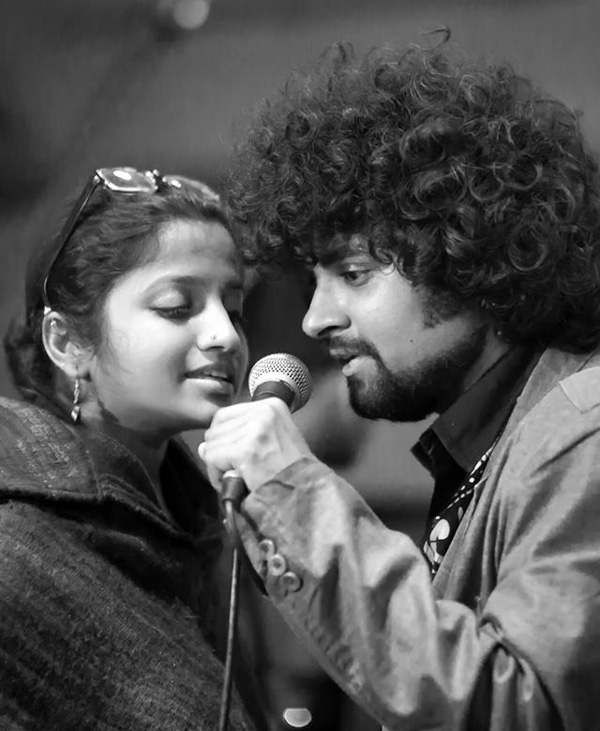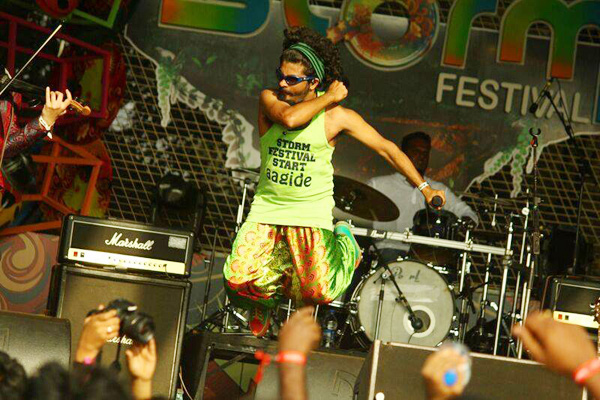For more on radio and music business news. | Click on RNMBiz



MUMBAI: Not more than five years ago, The Black Eyed Peas was blasting on my stereo and for a brief moment, I enjoyed the recognition of 'that-cool-hipster-who-listens-to-all-genres’. And then rang the doorbell. For everyone else, nothing changed. Although, in my case, I heard two sounds - the doorbell and the sound of someone burst my bubble. Half a minute later, the new entrant took over the music responsibilities, and then the recognition (that earlier belonged to me). Before I could even challenge him for the title, the keys were pressed, links were opened, and another half a minute later, the JBL stereos started singing a completely different tune. Not saying we could nail the Peas' single effortlessly, but the song that replaced in the tiny room packed with aspiring musicians, brought a totally new factor to the atmosphere - Language. The voice did not sound familiar, and neither did the sound. In a room majorly dominated by the Marathi-speaking metalheads, the vocals did not take enough time for an approval. "Ee bhoomi Swarga agutide nodu" sang the voice, and as soon as the language was established, all the heads turned to me. For someone who understands Kannada, the song made more sense to me, however, multiple plays later, not a single pair of lips hesitated to hum the lyrics. And that is how Vasu Dixit (or his compositions, rather) became a part of the music library that I usually gloat about.
The refreshingly electric sound that captivated the room was a result of five Bangalore-based musicians’ project tilted ‘Swarathma’. For over four years, Vasu Dixit - through Swarathma - provided me several reasons to attend the band's live shows, and more often than not, I never turned down the indirect invitations. Strangely, I do not remember a lot about the music of when I heard Swarathma live for the first time. But I do recollect the frontman, dressed fancily, searching ways to ensure all eyes are set on him. To be fair, the frontman needs to carry that burden (or the limelight – however you put it). And Vasu loves the ‘extra’ pressure that comes with added responsibility, but the Mysore-born vocalist seems more relaxed than most of his counterparts. Ardent music lovers of the scene highly regard him as one of the finest frontmen and Vasu believes the tag does not remain applicable off the stage. “When we are not doing music or performing live, I am no longer the frontman. Off the stage, everybody is a frontman,” reminded Vasu. On his shows, Vasu tends to forget where he is, and the attitude seems extremely contagious. Belonging to the family inclined (in a way or other) towards art, Vasu always wanted to be an artist. So did his elder brother. And the Dixits surrendered themselves to the art that asked for their services. Incidentally, their art involves receiving direct and immediate responses from the audience. And Vasu relishes the very fact. “I did theatre, and like music, what I find extremely fascinating about the two arts is the immediate response,” educates Vasu.
The second time Vasu burst my bubble occurred during the most unexpected of times. Waiting inside AR Rahman’s vanity van behind the NH7 stage, the moment arguably could have been the biggest of the professional life that I had begun only a couple of months ago. The ‘Mozart of Madras’ stepped into his vanity van, and once again, for a brief moment, I was the biggest Rahman fan inside a room. But No! Vasu had different plans. Soon, the younger Dixit (and his wife and Swarathma) entered the room, and like the Marathi-speaking friend, took away the recognition I held for a brief moment. In a scenario where Rahman sat inches away from me, I was constantly reminded of Vasu’s presence in the room. Among the several possible words I could utter, I stuck to “Hey, nice set.” Swarathma had performed an hour earlier, and to believe that I’d find myself with Vasu and Rahman in the radius of a couple of metres could only be passed as a joke. Vasu did burst my bubble again, however still, he managed to provide me something bigger to cherish for the rest of my life.
Be it Swarathma, Vasu Dixit Collective or the collaboration with his talented wife Bindhumalini, Vasu has a lot more to offer. RollingStone India called him ‘one of the best frontmen’ of the country, and the accolades and applause – however welcoming – fell short from becoming Vasu’s ideal compliment. The frontman remembers one such immediate response that will continue to remain his ‘moment de gloire’. With a performance at a blind school, Vasu executed another of his tendencies – the act of giving back to the society. “During one of the Swarathma Action Replay shows at a blind school, I went to one of the kids, and his hand touched my face, hair, and for a moment he got scared. Later, he touched my throat. At the very moment, I thought someone has held my voice. It is difficult for me to explain the moment and the beautiful emotions it generated. One can listen to the voice or understand it, but holding someone’s voice requires some extra-ordinary connection. It wasn’t about the kid or me or Swarathma. It was about the moment. I don’t know if it’s a compliment, but what I felt at the moment is my biggest purpose as a singer. Whenever I doubt myself, I go to the moment when the hand held my voice,” said Vasu.

Like his brother, Vasu calls himself “a spiritual guy, but rebellious when it comes to religion.” And unlike his brother’s Bollywood project, Vasu hopes to provide music to a movie that’d go with his identity. “For Bollywood, he tried to curate to a very different audience. On the other side, the music for his Kannada projects are very Raghu-esque,” explains Vasu. The vocalist idolises poet Kabir, and the latest effort – Vasu Dixit Collective – will largely focus on sharing the teachings of Kabir through Vasu’s understanding of music. The intent to highlight religious hypocrisy extends beyond music, and the play called ‘Yeshu, Allah aur Krishna’ (named after the Swarathma single) became Vasu’s another medium to achieve the same. “I am an artist first, and a musician later,” and trust Vasu to find ways to ensure the priorities do not interchange.
Vasu Dixit Collective is an extension of the singer’s musical journey as an artist. The purpose to incorporate folk songs of some of the poets that influenced his musicality, Vasu formed the band comprising of a young Mysore-based drummer Shreekanta, guitarist Ashish Minz, bassist Abhilash Lakra, Ashwin Walawalkar on harmonium and violinist Grace Biswas. “I wanted to try certain things that did not fit into Swarathma’s identity; songs and verses written by poet Kabir or Purandara Das and also some originals. Vasu Dixit Collective provides me the platform to learn and share more music with other musicians.”

The bold and free spirited composer prefers to sing about absolutely anything that has had an impact on his life, and the multilingual lyrics only acts as the icing on the cake. The duo will feature an interesting line up of musicians and multi instruments like cello, violin, guitars, keyboard, harmonium, drums and percussion. This collaboration of Bindhu and Vasu is more than a musical one: it promises to be an expression of the togetherness they share in real life, but told in tunes, melodies and more.
The Vasu Dixit journey will continue. The singer might explore more ways and mediums to fulfill the artistic desires, and hopefully one day, I walk into a room and utilise a ‘Vasu Dixit Collective’ composition to burst someone’s bubble, thus leading to a chain reaction.